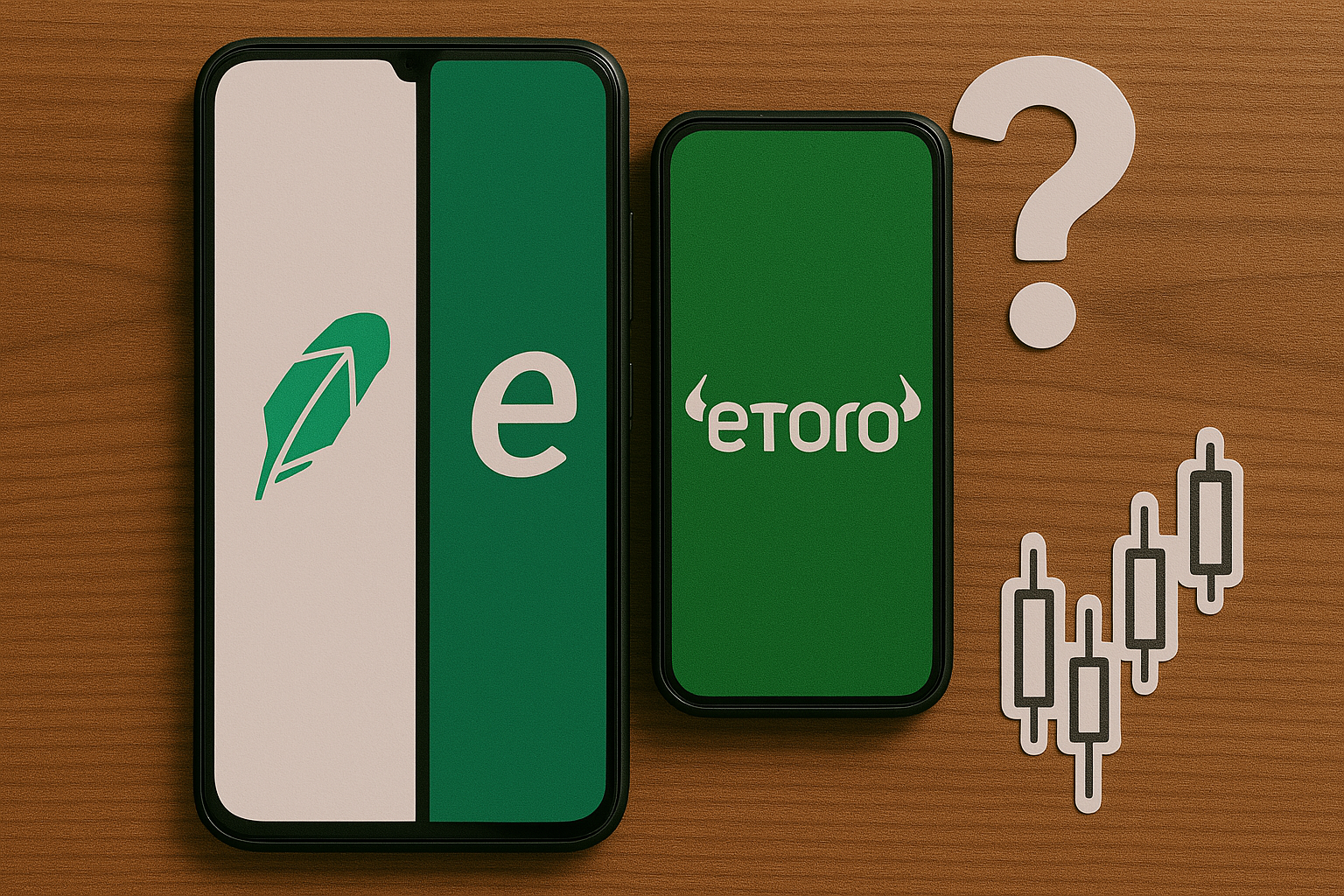Robinhood vs. eToro: Which App is Better for Investing?
5th May 2025
Jake Hopkins
In the continuously evolving landscape of online investing apps, selecting the appropriate platform can have a significant impact on one's financial journey. This article provides an analysis of two prominent trading applications, Robinhood and eToro, by comparing their investment options, fee structures, user experiences, account types, and security measures. Whether an investor is seasoned or a novice, comprehending the strengths and weaknesses of each investment platform will facilitate well-considered choices. Which application emerges as the superior choice for your investment requirements? Continue reading to discover the answer.
Overview of Robinhood and eToro
Robinhood and eToro are two notable investing applications that have transformed the landscape of stock trading by providing commission-free trading and an intuitive mobile trading interface.
Robinhood is recognized for its straightforward design and emphasis on beginner investors, while eToro distinguishes itself through its distinctive social trading features, which enable users to replicate the trades of seasoned investors, enhancing community engagement.
Both platforms serve diverse user demographics and offer various investment options, contributing to their popularity in the financial markets, reflecting broader investment trends.
Investment Options and Fees
In evaluating investment options, both Robinhood and eToro offer a diverse array of asset classes, including stocks, exchange-traded funds (ETFs), and cryptocurrencies, accommodating advanced traders and beginner investors alike.
However, their fee structures exhibit notable differences. Robinhood is recognized for its commission-free trading model, rendering it an appealing choice for novice investors seeking to reduce expenses and focus on portfolio management. Conversely, eToro implements a variety of fees, including those associated with withdrawals and deposit requirements, which may affect the overall trading costs for users.
Comparison of Available Investments and Associated Costs
Both Robinhood and eToro provide a variety of investment options across multiple asset classes; however, the associated costs may vary due to differences in trading commissions and transaction fees. Robinhood permits users to trade stocks and ETFs without incurring any commissions, while eToro may impose spreads and fees for certain transactions, which can affect the overall expenses of maintaining a well-diversified investment portfolio.
These variations in fee structures can significantly influence an investor's approach to market analysis, investment strategies, and portfolio management. For example, Robinhood's commission-free trades may encourage frequent trading, day trading, and active portfolio adjustments, whereas the costs associated with eToro may prompt users to engage in more deliberate and strategic investments, carefully considering the expense of each trade in relation to the potential for profit.
Both platforms offer tools and resources, such as research tools and financial tools, for analyzing market trends and performance; however, understanding the cost implications is essential. This understanding enables investors to develop customized strategies that align with their financial objectives while effectively navigating the complexities of trading expenses.
User Experience and Interface
User experience is an essential component of any financial platform, and both Robinhood and eToro provide distinct mobile interfaces aimed at enhancing user satisfaction and mobile accessibility.
Robinhood's intuitive design facilitates easy navigation for beginner investors, while eToro offers unique trading features, such as social trading and comprehensive market research tools, that cater to experienced traders seeking a more interactive experience.
Each application prioritizes platform accessibility and customer support, such as live chat support, ensuring a positive user journey.
Ease of Use and Customer Feedback
The user-friendly design of both Robinhood and eToro has been a significant contributor to their widespread popularity, with user reviews frequently underscoring the intuitive application features and trading tools they offer. Robinhood is particularly favored by beginner investors due to its straightforward navigation, whereas eToro receives commendations for its advanced social trading functionalities that promote community engagement.
Many users have noted that Robinhood's streamlined user interface facilitates the effortless execution of trades, making it accessible even for individuals who are just beginning their investment journey. Testimonials indicate that investors value the absence of commission fees as a notable advantage, which enhances their overall trading performance.
Conversely, eToro users often highlight the innovative educational resources available on the platform, which enrich their trading experience and enhance financial literacy. These users frequently describe their engagement with the platform not merely as a means of trading, but also as an opportunity to learn from experienced peers through real-time discussions and the exchange of investment insights.
Security and Regulation
In the current digital landscape, the implementation of security features and adherence to regulatory compliance are of utmost importance for investment applications such as Robinhood and eToro, especially in volatile market conditions.
These platforms prioritize the protection of user information and funds by employing comprehensive security measures, including stringent account verification processes and customer support options, such as live chat support, to effectively address user concerns related to data security and investment risk.
Such measures are essential for fostering and maintaining user trust, particularly in the context of increasingly volatile financial markets.
Measures in Place to Protect User Information and Funds
Both Robinhood and eToro have instituted comprehensive measures to protect user information and funds, ensuring adherence to strict regulatory compliance standards.
Robinhood utilizes encryption technology and two-factor authentication to enhance the security of user accounts, whereas eToro improves its security framework through tiered account types that offer varying levels of protection based on user activity and trading volumes.
Along with these foundational security protocols, both platforms are dedicated to transparent communication and provide robust customer support to assist users with any security-related concerns.
Robinhood's specialized team is readily available to address inquiries and offer guidance on best practices for account protection. Similarly, eToro employs a risk management strategy that involves monitoring transactions and flagging suspicious activities, thereby ensuring a safe trading environment for its users.
Through regular updates and security education initiatives, both platforms aim to foster an atmosphere where individuals can confidently manage their investments.
Final Verdict: Which App is Better for Investing?
Determining the superior investment app between Robinhood and eToro ultimately hinges on individual investment goals and preferences, as well as their desired investment strategies. Robinhood is particularly appealing to beginner investors who seek a straightforward approach to stock trading, thanks to its user-friendly interface, commission-free model, and simple payment methods. Conversely, eToro caters to advanced traders by offering a diverse array of investment options, social trading features, and international markets access, which enhance user engagement and trading performance.
A careful evaluation of both platforms' strengths, such as their app functionality and trading algorithms, can aid users in making informed decisions aligned with their trading strategies.
The decision between these trading applications is influenced by multiple factors, including the desire for social interaction in trading, availability of leveraged trading, and the necessity for advanced analytical tools. Robinhood's simplicity attracts those who are new to market analysis and prefer to explore trading without being confronted by an overwhelming array of features, such as algorithmic trading and complex exit strategies.
In contrast, eToro distinguishes itself through its innovative social trading capabilities, allowing users to follow and replicate the strategies of successful investors, a feature that can prove particularly advantageous in volatile markets and contribute to diversification strategies.
User reviews frequently highlight Robinhood's ease of use; however, some users express concerns regarding customer support and the platform's limited asset offerings, impacting investment performance. On the other hand, eToro is commended for its extensive selection of assets, vibrant community, and fintech solutions, although it may be perceived as somewhat complex for inexperienced traders.
Both applications reflect broader market behaviors in terms of trading volumes and investment trends, making them valuable tools for various types of investors, from those seeking wealth management to those interested in startup investments.















